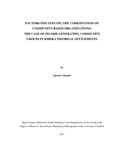| dc.description.abstract | Community-Based Organizations (CBOs) are useful conduits for donor funded grassroots
development. However their high tendency to disintegrate puts the sustainability of such
efforts at risk thus wasting valuable resources. Noteworthy, this situation seems to be
exacerbated by external assistance. In light of this challenge, this study sought to find ways of
enhancing the cohesiveness of CBOs by exploring the influence of selected internal factors
on their cohesiveness. The objectives of the study were to examine the relationship between
the size of CBOs and their cohesiveness, evaluate the association between membership
diversity and cohesiveness of CBOs, assess the influence of the nature of project on the
cohesiveness of CBOs, analyze how the nature of leadership affects the cohesiveness of
CBOs and review the effect of communication patterns on the cohesiveness of CBOs. A
cross-sectional survey was carried out targeting income generating CBOs in Kibera Informal
Settlements. A total of 47 CBOs completed group questionnaires and had demographic data
on their members collected through individual questionnaires. Chi-square technique and
Spearman’s rank correlation were used to test for relationships between the selected factors
and the cohesiveness of the CBOs. The study found significant relationships between four of
the factors studied and the cohesiveness of CBOs. The composition of CBOs including their
size and membership diversity was found to significantly influence their cohesiveness.
Contrary to previous studies on cohesion of groups, larger sized CBOs were found to be more
cohesive than smaller sized ones. Gender and age homogeneity were also linked with higher
levels of cohesiveness. Moreover, charismatic, inclusive and decisive leadership was
associated with more cohesive CBOs. Specifically, CBOs that elected their leaders based on
their social skills rather than fund raising skills, in which delegation of decision-making to
members was common and penalties were more severe showed higher tendencies to be
cohesive. Decentralized communication networks were also related to more cohesive CBOs.
Very frequent interaction by members was on the other hand was found to have a negative
effect on the cohesiveness of CBOs. Based on its findings, this study encourages the
formation of gender and age homogeneous CBOs. The study also recommends educating
CBO leaders on the benefits of delegated decision-making and decisive penalties on cohesion
of CBOs. Moreover, CBO members are encouraged to choose their leaders based on their
social skills rather than perceived mastery of the task at hand. Decentralized communication
between CBO members is encouraged especially for complex tasks. While members of
CBOs are encouraged to meet regularly, very frequent informal interaction is discouraged. If
such frequent interaction cannot be avoided then a constant flow of accurate and clear
information should be ensured to counteract gossip and rumors. Finally, further investigation
into the relationship between the size and cohesiveness of CBOs is suggested. These findings
will be useful in enlightening members, leaders and development workers on how the
cohesiveness of CBOs can be enhanced, thus contributing to more sustainable CBOs. | en |

